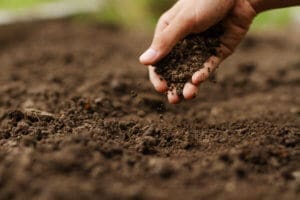How to Amend Your Soil for Successful Gardening
Depending on where you live in Southern Oregon, your soil may be very sandy; contain a high volume of rocky, volcanic material; or be composed of sticky, clay material. Regardless of which challenge you’re up against, there are a few tricks to dealing with difficult soil to create a bountiful garden.
First, determine what kind of soil you have and then add amendments to improve its quality. Adding organic materials to the soil will generally improve its conditions. Sandy soil drains too quickly, leaving the ground dry. Organic matter will help bind the sand and improve its nutrient and water holding ability. On the other hand, clay soil is very dense, and water does not drain well, leaving the ground hard or water clogged. Organic matter will break up the clay molecules to create more drainage. Patience is required as organic matter amends soil slowly. It could take a year or more to get to the ground where it needs to be.
conditions. Sandy soil drains too quickly, leaving the ground dry. Organic matter will help bind the sand and improve its nutrient and water holding ability. On the other hand, clay soil is very dense, and water does not drain well, leaving the ground hard or water clogged. Organic matter will break up the clay molecules to create more drainage. Patience is required as organic matter amends soil slowly. It could take a year or more to get to the ground where it needs to be.
Soil additives and mixes can also be applied to the top of the ground and tilled into the soil. Worm castings serve as a natural compost and fertilizer to add valuable nutrients to the earth. Other materials such as living soil or rhyolite can increase drainage and help break up tough clay.
Once you apply the material to the ground, it needs to be tilled into the soil to avoid layering. Ideally, amendments should be added and mixed into the earth in the fall, so they have several months to do their work before planting begins in early spring. Only till the soil when it needs it, such as when adding amendments. Excessive tilling will destroy the natural quality of the soil. Also, don’t till the soil when it is wet. When it dries, you’ll end up with clumpy, compacted soil.
Cover crops can enhance the quality of soil in more extensive gardens or field gardens. In Oregon, an excellent cover crop is crimson clover. The cover crop is planted in the winter (ideally by October 1) and then tilled into the ground in early spring before planting begins. The cover crop works the soil to increase drainage ability, and the tilled crop adds nutrients to the ground.
An excellent way to create your own organic material for your garden is by composting. You can add many food wastes and yard clippings to a compost bin or pile throughout the year. The material heats up, breaks down, and creates an organic material filled with nutrients. Shredding or cutting the waste before adding it to the bin will help increase the speed of the composting process. Never put diseased plant material, meat or dairy products, or pet or pig manure into the compost bin.
Simplify Garden Preparation with Expert Advice from Hilton Landscape Supply
If you’re unsure how to prepare your soil for the garden, visit Hilton Landscape Supply for some free advice. Bring in a sample of the soil you’re dealing with and tell us what you’d like to plant. We’ll walk you through many of the materials, additives, and fertilizers we carry to help you determine the best mix to amend your soil.
